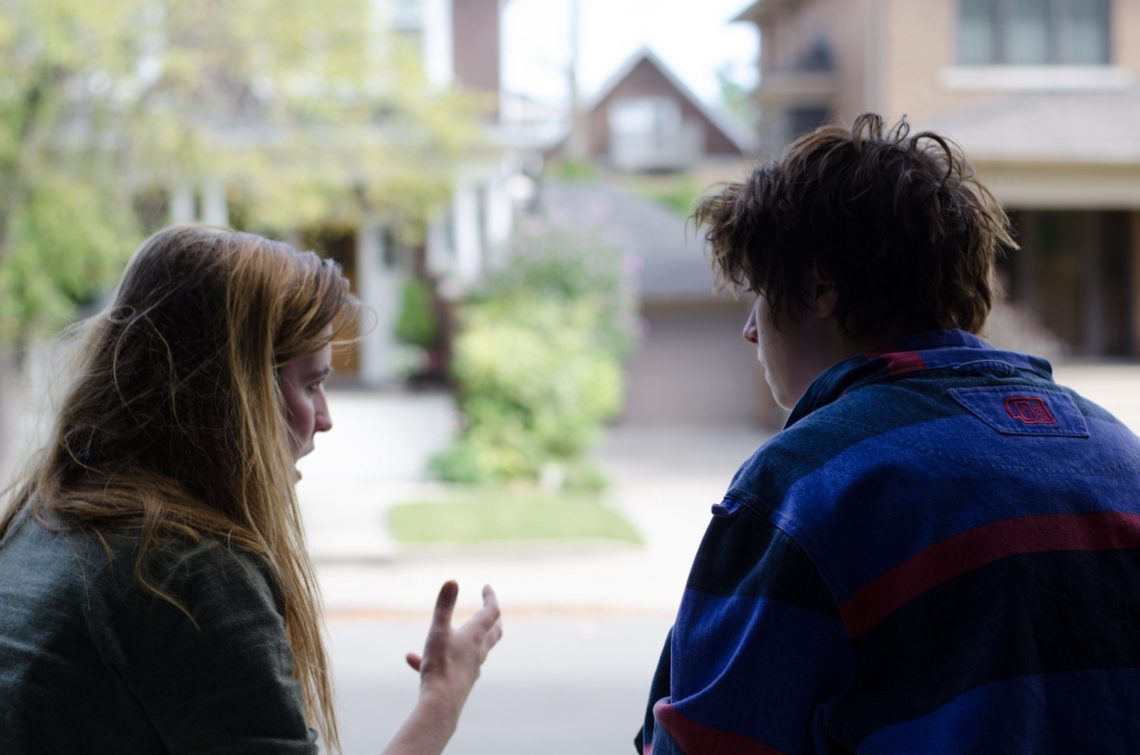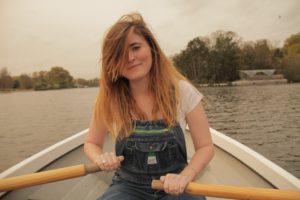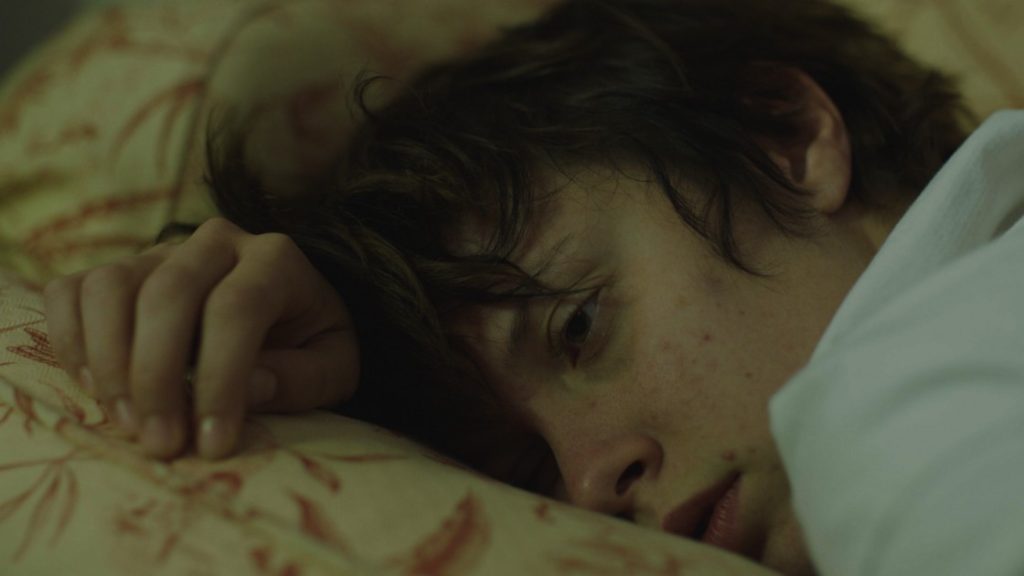
A Woman’s Block Interview: Rebeccah Love
“A part of me feels that we are collectively experiencing a loneliness epidemic. I am curious to find out how cinema alleviates the pain of this loneliness.”
There is an unnerving silence to depression. Whether it is the retreat to an empty room or the awkward pauses in conversations with friends or family — the vacancy is weighted.
A WOMAN’S BLOCK uses these quiet moments to underline the uncomfortable exchanges between Christine and her neighbours after she experiences a bad episode.
It is through these bumbling conversations the real beauty shines.
I grew up in a small town where you couldn’t go two minutes without bumping into someone you know. These were regular occurrences. But living in cities, particularly London, England, was the opposite. You were invisible every time you left the house and making eye contact, especially on the tube, was frowned upon.
To see a film show a city where bumping into someone you know and where neighbours not only interact but feel empathy towards one another is wonderfully foreign. All it takes is a simple chat, whether it’s a stiff, clumsy exchange or a full graceful conversation, to change someone’s mood.
In under ten minutes, A WOMAN’S BLOCK articulates more than some do in three hours and makes me excited to see what Love can do with a full-length feature.
 Rebeccah Love is a writer and director born and raised in Toronto. She began acting in high school and during her time at the University of King’s College she participated as an actor and director in the King’s Theatrical Society. She completed her BFA at Ryerson University and recently completed her MFA in creative writing at the University of Guelph. A WOMAN’S BLOCK is Rebeccah’s sixth short film.
Rebeccah Love is a writer and director born and raised in Toronto. She began acting in high school and during her time at the University of King’s College she participated as an actor and director in the King’s Theatrical Society. She completed her BFA at Ryerson University and recently completed her MFA in creative writing at the University of Guelph. A WOMAN’S BLOCK is Rebeccah’s sixth short film.
A WOMAN’S BLOCK is premiering on August 28th at The Pilot Tavern in Toronto and will feature talks by Dr. Vicky Stergiopoulos, Antoine Bourges, Laura Kalef, Lydia Beck, Elysse Leonard and Love. For more information on the screening, click here.
Tell us a little bit about yourself and how you got involved with filmmaking.
Rebeccah Love: My family, like many other 90s families, had a tradition of renting a Blockbuster film every Friday. My Dad is a huge cinephile so he would curate the selection, starting off with silly kid movies, and as we grew older, throwing in some classics. We just started getting into the Katharine Hepburn / Jimmy Stewart / Peter Sellers movies when I hit my teenage years and no longer wanted to stay at home on a Friday night.
I lived an hour and a half away from my high school, and while I had an outstanding group of friends as a teenager, that distance is not insignificant. I wouldn’t have identified as a lonely person, for the most part, I was always busy doing something, seeing people, writing for my school paper, playing sports. I did a lot of theatre, which became my introduction to the world of entertainment. But I’d also have these long, drawn-out Saturdays…it was during these moments that I started wandering to my local Blockbuster myself. I became obsessed with Charlie Kaufman and his notion of performance. I was attracted to films with sweet scores (Goodbye Lenin) and films with wacky premises (Eternal Sunshine of the Spotless Mind, I Heart Huckabees). Anything with a wild production design concept (Moulin Rouge, The Science of Sleep, The Royal Tenenbaums). At the very end of my teenage years, I watched Guy Maddin’s My Winnipeg and that probably hit me like no other film I had ever seen.
Around this time, I saved up my money from theatre arts camp to purchase a camcorder, and wow was I obnoxious shoving that camera into people’s faces! I captured a lot of school events, observational documentary style. This continued into university, where I started capturing events on campus, particularly concerts.
After my first year of university, everything changed. I was diagnosed with a disease that left me feeling very broken. The universe of film, a place previously associated with entertainment, suddenly became a refuge. I enrolled in Film School, started writing and directing, (mostly love stories) and haven’t stopped since.
After graduating from Ryerson, I was diagnosed with a second disease, only heightening the need for escape. I completed an MFA in Creative Writing at the University of Guelph and continue to produce films. My interests today revolve around illness, loneliness and community…but above all things, I’m interested in optimism.
Tell us about A Woman’s Block.
RL: A Woman’s Block is a story about a woman recovering from a mental health crises. It is meant to be a portrait of a neighbourhood where people are looking out for one another. It is a story about little moments, and how the layering of these little moments can totally shape how a person is experiencing the world.
The film is very quiet, why did you choose to use diegetic sounds instead of a score?
RL: I wanted to heighten the audience’s understanding of our protagonist’s experience by staying as true to her reality as possible. Also, I think the sounds of a neighbourhood are equally as interesting as the visual components. Our post-production sound team of Chris King and James Bastable paid such careful attention to the neighbourhood soundscape…in the past, I seem to have overlooked sound but these two brilliant craftsmen have totally transformed my understanding of the importance of sound editing and the sound mix. (But I am too fond of big and sweet scores to veer too far away from working with a composer: Thomas Hoy is a musical genius and I’m just counting down the days before I can work with him again!)
A Woman’s Block deals with the aftermath of an episode of mental illness and how it affects not only Christine but her neighbours. Why did you want to explore mental illness in this way?
RL: Depression is not a sexy mental illness, nor does it make for exciting dramatic action. It is a disease that can take many forms, but often it leads to lethargy, sleeping, loneliness, all things that are difficult to tell exciting stories about. I wanted to craft a story that included this element of the disease, but one that ultimately captures our civic responsibility to take care of one another. Those suffering from mental illness can sometimes retreat into themselves…by forcing Christine out onto the street, I really wanted to capture how just having a simple conversation with another person can colour their day.
Our team of collaborators on this project, particularly cinematographer Eric Rowe and editor Dan Haack, (who are both two of the most wonderful people I’ve ever met) showed such a profound understanding of the ideas propping up the film, that our conversation has not ended with the final cut of A Woman’s Block. We’re still trying to wrap our heads around what it means to be young and living in the city, trying to find connection and feel fulfilled. How government policy and city planning can help shape our mental health, how communities can thrive.

Usually, films that centre in cities show an alienation from neighbours. Was it important for you to show a connection between neighbours in a city or were you going for a more universal feeling?
RL: I think we need to fight against this notion that cities are lonely places both in the stories we tell and in the way we engage with our communities. Back to this question of optimism: I am optimistic that we can do better to care for those who seem stuck in their houses, those with medical problems, the elderly, the lonely. I’m reminded of one of my favourite quotes, by Tennessee Williams:
“When so many are lonely as seem to be lonely, it would be inexcusably selfish to be lonely alone.”
A part of me feels that we are collectively experiencing a loneliness epidemic. I am curious to find out how cinema alleviates the pain of this loneliness.
Can you tell us about some/all of the other amazing women who worked on this/or other films by you?
RL: How much space do I have? Haha, I would love to write a book about all the women who keep me going!
Have to start with Sarah Swire, who plays the main role in A Woman’s Block, and who also stars in Acres, my previous film. I will try my very best to capture Sarah in words but ultimately I will fail because she is one of these people whose light is shining so very bright that it is hard to concentrate on anything like writing interview answers because even in just thinking about what a powerful actress she is I am a little blinded by her talent and energy and attitude. But trust me if I was a better writer with a more extensive vocabulary I would write this perfect sentence and you’d be like “oh she DOES sound amazing!” She choreographed the dances and acted in Anna and the Apocalypse and has also worked doing choreographies for Snow Patrol and Belle and Sebastian. Anyways I’m working with her on another project this fall and let’s just say I count my blessings that she signs up for these projects, these films would be so very lacking without her.
But that’s just the beginning of the list!
I’d also like to take this opportunity to talk about Maria Komech, who did the sound edit for Abacus, My Love, and the edit for Drawing Duncan Palmer and Acres. If ever patience and kindness were personified, Maria might just be the human form of these very important qualities. Filmmaking for me isn’t so much about making movies, it’s more about interacting with people in very unusual but often very moving ways. And I see the act of engaging with an editor as being a most intimate and powerful correspondence. So not only was Maria 150% committed to her storytelling, but she has also been such a pleasure to communicate with, her emails things to look forward to reading. In another life, Maria could have been a poet with whom Rainer Maria Rilke corresponded.
Olivia Tran and I have worked together on a bunch of different films. She is a talented, patient and hard-working producer who stays calm in ever the most stressful of circumstances. Without her, I would not be where I am today.
A fourth person who I would like to talk about is the star of Drawing Duncan Palmer, Chloé Hung. Chloé is not only an actress: she is a playwright, a play director, a screenwriter, and a film director. Writing this now I don’t actually think I can summarize all that she has accomplished because she is always up to something new and I can barely keep track. When she’s not receiving rave reviews in the Globe and Mail for her play ‘All Our Yesterdays,’ she’s off studying dramatic writing at NYU or writing screenplays for Oscar-nominated Ava Duvernay’s new show “Queen Sugar”. She keeps a career going in three different cities across the continent and has this drive that inspires me always to keep me going.
Amelia Stea Maclaurin is a Toronto based artist and also one of my oldest friends. She designed the poster for A Woman’s Block and drew the portraits in Drawing Duncan Palmer. I am blown away by her creative talent, her energy, her aesthetic. In her work, I see a love of neighbourhoods and community that has totally inspired my own stories.
The woman who introduced me to filmmaking, Natasha Hunt, probably has the richest cultural knowledge of anyone I’ve ever met, and I am forever grateful for her curiosity and generosity of spirit.
Tell us about why you are a feminist?
RL: I can’t picture being any other way.
Who are your favourite women working in the film industry?
RL: Sophia Coppola is one of my favourite directors. I also love Miranda July.
I’m following with great interest the careers of Sophy Romvari and Joële Walinga.
I really admire Toronto-based producer Karen Harnisch for the work she has done.
And I have a lot of love for the women who do film journalism. I try to catch Tina Hissannia’s segments on CBC’s Q as often as I can, I always learn a lot from her commentary.
What’s the best advice about filmmaking you’ve ever received?
RL: It was not advice directly about filmmaking but it is what led to my filmmaking. Right after graduating high school, a second cousin of mine, Darcy Mackenzie, asked me what my plan was. “I’ll probably do an undergrad in poli sci and then go to law school.” As a response, he said this: “Rebeccah, you only have your twenties once. Once you turn 30, things get a little complicated, you might have other obligations. Then you can go to law school. But as best as you can, try to do the things you love when you’re young.”
Those words stayed in my mind. I have an LSAT practice test bookmarked in my browser but I don’t think I’ll ever be called to the bar.
What are you working on now/next?
RL: I’m working on a new short film with Sarah Swire and screenwriter/actor Conor Casey. The project is inspired by one of Conor’s comics about avocados.
What three people, living or dead, would you invite to your fantasy dinner party?
RL: 1. the entire staff of my local coffee shop
2. Russian illustrator Ivan Bilibin
3. my Great Aunt Sheila
What are your three favourite smells?
RL: 1. fried onions
2. sawdust
3. wet dirt
Finally, recommend one #MUFFApproved** film for our blog readers!
RL: The Diary of a Teenage Girl by Marielle Heller was colourful, imaginative and a little bit haunting.
Keep up to date with A Woman’s Block: Facebook
*This post was originally featured on The MUFF Society.*

